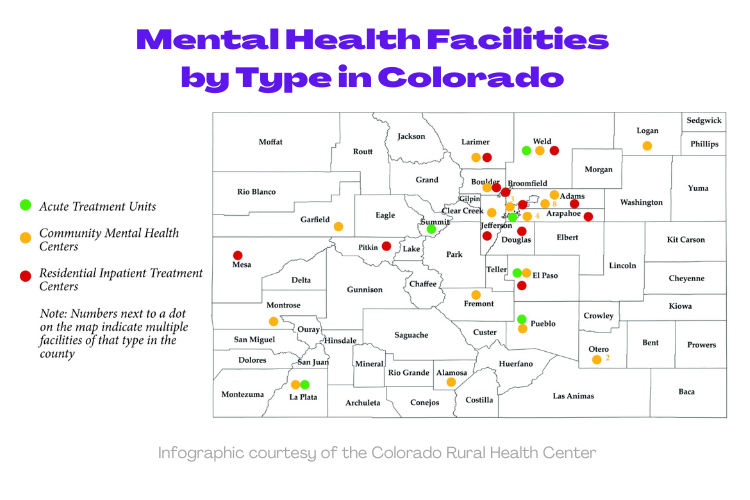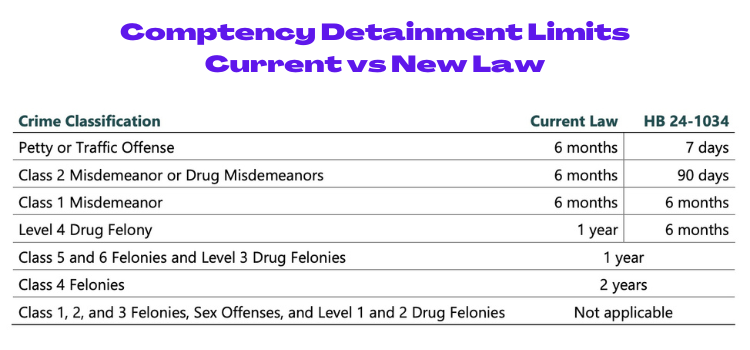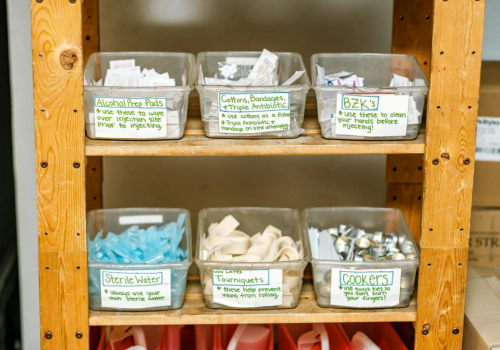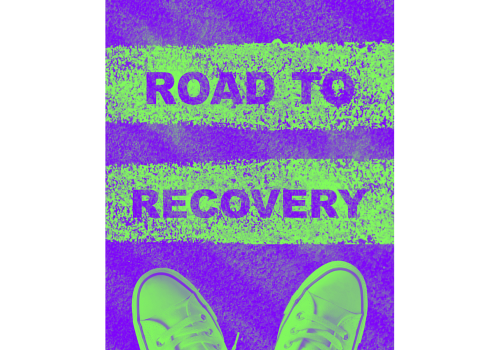By Renata Hill, Moodfuel
Recapping the details of mental health legislation introduced in the Colorado statehouse in 2024 and the implications of our new laws
Colorado's 74th General Assembly concluded May 8. Of the 31 mental health bills we've tracked this session, 22 made it to the desk of Gov. Jared Polis and eight have been signed into law as of publication date. This year, legislators focused primarily on two challenges affecting neighbors statewide:
- Improving youth mental health
- Deflecting people with mental health or intellectual challenges from jail into treatment facilities.
New mental health laws signed
1) Pre-Trial Diversion (Senate Bill 006): Judges can deflect people away from jail who are living with serious mental illness or cognitive challenges and who have carried out low-level crimes, such as public urination, to programs providing mental health treatment, life skills training and social supports. A decrease in court workload and costs are associated with this law.

What It Means
As of Mar. 2024, 326 people charged with misdemeanor crimes, who can't participate in their own defense, have been warehoused in Colorado jails before trial without treatment or social supports for months. The goal is to dissolve Colorado's longstanding competency backlog, increase humane treatment and save $12 million per year in fines levied by a federal consent decree.
2) Mental Health Professional Practice Requirements (Senate Bill 115): This law eases registration and candidacy requirements for mental health professionals in training, including psychologists, social workers, marriage and family therapists, professional counselors and addiction counselors. The Colorado Dept. of Regulatory Agencies must update rules regarding these changes. No cost is associated with this initiative.

What It Means
Now, more mental health professionals can complete practice requirements and ensure their ability to qualify for licensure, helping to decrease Colorado's dire shortage of counselors.
3) Opiate Antagonists and Detection Products '''bv Schools (House Bill 1003): High school students may administer the opiate reversal drug Naloxone without legal repercussions nor school disciplinary action. The law also states possession of Naloxone may not be used as probable cause to question a student or search personal possessions. Signed by Lt. Gov. Dianne Primavera while Polis was out of state. No cost is associated with this initiative.

What It Means
High school students in La Plata County generated momentum for this bill, and several helped craft it, after their friend, an Animas High School sophomore, died from an accidental Fentanyl poisoning in 2021. Now, students, who tend to know much more about classmates' behavior and habits than adults do, can act as first responders in saving their friends' lives. It's a step forward in giving youth personal agency over their own mental health.
4) Persons Detained in Jail on Emergency Commitment (House Bill 1079): If a person under the influence of alcohol or a substance is a danger to self or others, law enforcement officers may take the individual into protective custody as an emergency commitment at a treatment facility, but this action is not considered nor recorded as an arrest. If no facilities are available, officers may detain the person in an emergency medical facility or jail, but only until the person is sober. No one under age 18 may be detained in jail for protective custody. The BHA must collect data from law enforcement agencies and treatment facilities. This diversion law costs $74,000 in fiscal year 2024-2025, decreasing to $53,000 in FY 2025-2026.

What It Means
According to an email from Rep. Judy Amabile, co-sponsor of the legislation, this law is about diverting people, especially youth, away from jail and into appropriate care to achieve recovery. Amabile said she sees this legislation as a first step and will return to it in the 2025 assembly to better hone the policy.
5) School Psychologist Licensure Interstate Compact (House Bill 1096): This interstate compact creates a pathway that enables school psychologists with eligible licenses to obtain equivalents in member states and establishes a commission to oversee the compact. No cost is associated with this law.

What It Means
According to the National Center for Interstate Compacts, these legally binding agreements help states collaborate on complex policy issues, such as public health, by promoting cooperative action. For this compact, established in 2024, Colorado joins West Virginia in lowering barriers to licensure mobility with the goal of increasing availability of school psychologists. However, membership must total seven before the compact applies.
6) Prohibiting the Term Excited Delirium (House Bill 1103): The stigmatizing phrase, "excited delirium," also known as "ExD," must not be used in any first responder training materials nor official documents, such as incident and coroner reports. No cost is associated with this law.

What It Means
The National Institutes of Health recognizes ExD as a clinical description of agitated behavior, but the American Psychiatric Association said it has been misapplied and overused, particularly in law enforcement incidents involving People of Color. As the police reform movement continues in Colorado, catalyzed by the tragic 2019 death of Elijah McClain in Aurora, state and municipal authorities are becoming more aware of and intentional about using official language.
7) Sharing of Patient Health-Care Information (House Bill 1217): The Colorado Office of e-Health Innovation must convene a working group to determine the most effective methods for creating a centralized, digital consent database that gives patients agency over their consent for sharing their medical data. Plus, the Colorado Behavioral Health Administration (BHA) must create a "family and friends" form that enables relatives to give background information to clinical staff. This program costs $54,000 in fiscal year 2024-2025, decreasing to $25,500 in FY 2025-2026.

What It Means
Families of patients receiving mental health or substance misuse treatment will be able to provide information that can inform treatment plans and, if the patient agrees, speak with clinical staff about the status and progress of their loved one. Staff members will be able to look up a patient's consent information easily.
8) School-Based Mental Health Support Program (House Bill 1406): Through the BHA, a third-party organization will train educators to provide mental health services for students, especially in rural and under-resourced schools, from the 2025-2026 school year until the summer of 2028. The administration of this program costs $2.5 million in fiscal year 2024-2025 to last until FY 2027-2028.

What It Means
Teachers and staff in at least 400 public schools in Colorado will receive training to identify and support youth who are experiencing mental distress or misusing substances.
Enactment without governor's signature
After the session-close as remaining bills stream onto the governor's desk, he has 30 days from a bill's arrival to sign or veto it. Therefore, the fate of all bills from this session will be determined in June. If the governor withholds action and no parties object, a bill becomes law on its effective date. As of this publishing date, the following mental health-related bills are scheduled to become law.

⦿ Continue Youth Mental Health Services Program (Senate Bill 001): Since suicide is the top cause of death for Coloradans age 21 and under, there was a reason the Colorado Senate made this bill priority number one. The iMatter youth mental health program (la versíon en Español) will continue to offer six free, confidential counseling sessions to youth age 18 or under (up to age 21 for those receiving special education services) until Jun. 30, 2034. It has made a difference to 10,166 young neighbors since Oct. 2021 with about 10% of the sessions in Spanish. The cost of this program is $11 million over the next two fiscal years.

⦿ Behavioral Health First Aid Training Program (Senate Bill 007): Colorado has improved only marginally in access to mental healthcare, moving from last place nationally in 2022 to 45th in 2023. Residents can offer immediate support if they learn to identify and talk to neighbors who are feeling mental distress. This legislation tasks the Office of Suicide Prevention to contract with a nonprofit partner for a statewide crisis intervention, train-the-trainer program. Educators, nonprofits, faith-based organizations, first responders, active-duty personnel and veterans may participate, then teach people within their own organizations. This program costs $250,000 beginning in fiscal year 2024-2025.

⦿ Increased Access to School-Based Health Care (Senate Bill 034): The Colorado Dept. of Early Childhood believes that when mental distress or mental illness are addressed as early as possible, youth are much likely to be successful in school and life. The School-Based Health Center Program facilitated by the Colorado Dept. of Public Health and Environment (DPHE) will meet students where they are through expanded services including mental health support delivered via telehealth, mobile services and clinic referrals. No costs are associated because this initiative will operate within the current budget. However, DPHE estimates the expansion will require one full-time person to manage it.

⦿ Prevention of Substance Use Disorders (Senate Bill 047): Colorado is the fourth worst state in the nation regarding the prevalence of youth substance misuse with primary care pediatricians commonly encountering it in middle and high school patients. This legislation empowers a public health approach, enabling multidisciplinary review teams in municipalities and tribal nations to collect information about overdoses for intervention planning. Also, a School-Based Health Center program must implement statewide educator and pediatrician training to identify and intervene in adolescent substance misuse.

⦿ Agricultural & Rural Behavioral Health Care (Senate Bill 055): Isolation, debt, drought and the stoic "cowboy way" affect many working in western agriculture, but Colorado ag workers face extreme barriers to achieving mental wellness due to lack of access; there is one mental healthcare provider for every 1,282 rural residents. This legislation addresses rural and agricultural mental healthcare challenges by creating a liaison position to connect the Colorado Dept. of Agriculture with mental healthcare providers, rural community leaders, agricultural communities and rural nonprofit organizations. Plus, an agricultural community workgroup, funded for five years, will provide lived experience feedback to the BHA and outreach to ag workers and their families. This program costs $763,000 in fiscal year 2024-2025, decreasing to $755,000 in FY 2025-2026.

⦿ Prohibiting Medicaid Prior Authorization (Senate Bill 110): About 250,000 Coloradans live with serious mental illness and need psychotropic medication to remain stable, but due to high drug costs and state bureaucratic requirements, many ration their medications by skipping doses, making stabilization challenging. This legislation eases the bureaucratic restriction set up by Colorado Dept. of Health Care Policy and Financing (HCPF) on antipsychotic medications for Medicaid-eligible patients, allowing them to access the medicine that work best for them instead of basing access merely on price. Increased access will cost $3.3 million in fiscal year 2024-2025 and $3.7 million in FY 2025-2026.

⦿ Eating Disorder Treatment and Recovery (Senate Bill 117): Many eating challenge treatment centers exist in Colorado, but advocates with lived experience have said these facilities lack regulations to ensure patient safety. This law compels the centers to incorporate cultural sensitivity, dignity and trauma-informed care into their practices. Also, the Colorado Dept. of Human Services (DHS) will designate levels of care for treatment facilities, and the BHA must regulate the use of involuntary feeding tubes. This initiative costs $500,000 in fiscal year 2024-2025, decreasing to $187,000 in FY 2025-2026.

⦿ Adult Competency to Stand Trial (House Bill 1034): As mentioned in a previous Moodfuel article, Colorado detains indefinitely in jail before trial hundreds of people living with serious mental illness or intellectual challenges who have been charged with minor offenses but can't participate in their own defense; the state also pays $12 million per year in fines for doing so. This criminal legal system reform specifies the options courts have and the information they can access, mandating competency treatment outside jails within certain time frames and clarifying guidelines for case dismissal based on the charge and the length of time the defendant has been detained waiting for mental health treatment. The initiative decreases the judicial workload statewide and no additional costs are associated.

⦿ Substance Use Disorders Harm Reduction (House Bill 1037): Harm reduction is an evidence-based approach critical to engaging with people who use drugs and equipping them to create positive change and potentially save their lives. Now, harm reduction centers may provide drug testing services and distribute equipment, syringe exchange participants may possess that equipment and good Samaritans can administer Naloxone (or other opiate reversal drug) during an overdose event without legal repercussions. There is no cost associated with this initiative.

⦿ High-Acuity Crisis for Children & Youth (House Bill 1038: The DPHE, BHA and DHS, must develop a system to support youth in foster care who are living with complex mental health needs. This legislation provides more residential treatment facilities, better-trained facility staff and emergency resources. It also requires the state to reimburse providers at a higher rate, monitor and report on quality within residential care facilities and start a pilot program supporting legal system-involved youth. The aspects of this initiative cost $26 million in fiscal year 2024-2025, $34 million in FY 2025-2026 and $38 million in FY 2026-2027.

⦿ Treatment for Substance Use Disorders (House Bill 1045): In 2020, more Coloradans died from overdose deaths than ever previously recorded and opioids contributed to 82% more deaths than the year before. Fortunately, research shows that a combination of medication and counseling using a whole-patient approach can treat substance misuse successfully, enabling people to achieve recovery and become balanced and self-directed. This legislation improves access to treatment, including medication-assisted treatment (MAT) for opioid addictions, reimburses pharmacies that prescribe these medications and improves state drug therapy guidelines. In addition, it expands training and support for addiction counselors, pharmacists, nurse practitioners and physician assistants in the administration of MAT and enables MAT-based recovery organizations to apply for grants. Further, incarcerated, Medicaid-eligible individuals will have access to needed services and treatment. Budgeting for these initiatives rolls through fiscal year 2027-2028, beginning with a cost of $3 million, hitting a high of $11 million and decreasing to $10 million.

⦿ Healthier Social Media Use by Youth (House Bill 1136): During a period of critical brain development between the ages of 12 to 17, youth nationally have self-reported that social media use consumes a significant portion of their day while many studies indicate a correlation between high usage, decreased sleep and poor mental health outcomes. This legislation aims to check the power of social media companies somewhat by requiring them to display a pop-up warning beginning Jan. 1, 2026 for users under age 18 who are on the platforms for certain lengths of time. Also, the Colorado Dept. of Education must create and maintain a database of evidence-based content and curricula pertaining to the impacts of social media for use in schools. This initiative costs $17,500 for fiscal year 2024-2025, decreasing to $11,000 in FY 2025-2026.


⦿ Student Weight-Based Bullying Prevention (House Bill 1285): When she was younger, Aimee Resnick was bullied in school mercilessly for her size, she said in a message. As co-founder of the Colorado Alliance for Size Equity, Resnick said she helped craft this legislation to prevent others from experiencing the same deep trauma. Bullying based on weight, height or body size has been added to the list of banned behaviors subject to school discipline policies and reporting.

⦿ Measures to Reduce the Competency Wait List (House Bill 1355): Bridges of Colorado, with the consent of district attorneys, will divert from the criminal legal system to mental health programs people who have been charged with minor offenses and have been judged incompetent to face trial. The individuals will participate in wraparound care programs resulting in increased stability and dismissal of cases that would otherwise add to Colorado's inhumane competency backlog. If the state dissolves the backlog, it will no longer be required to pay $12 million per year in fines ordered by a federal consent decree. This deflection initiative will cost $1.7 million in fiscal year 2024-2025, increasing $4.2 million in FY 2025-2026 and $5 million in FY 2026-2027.



